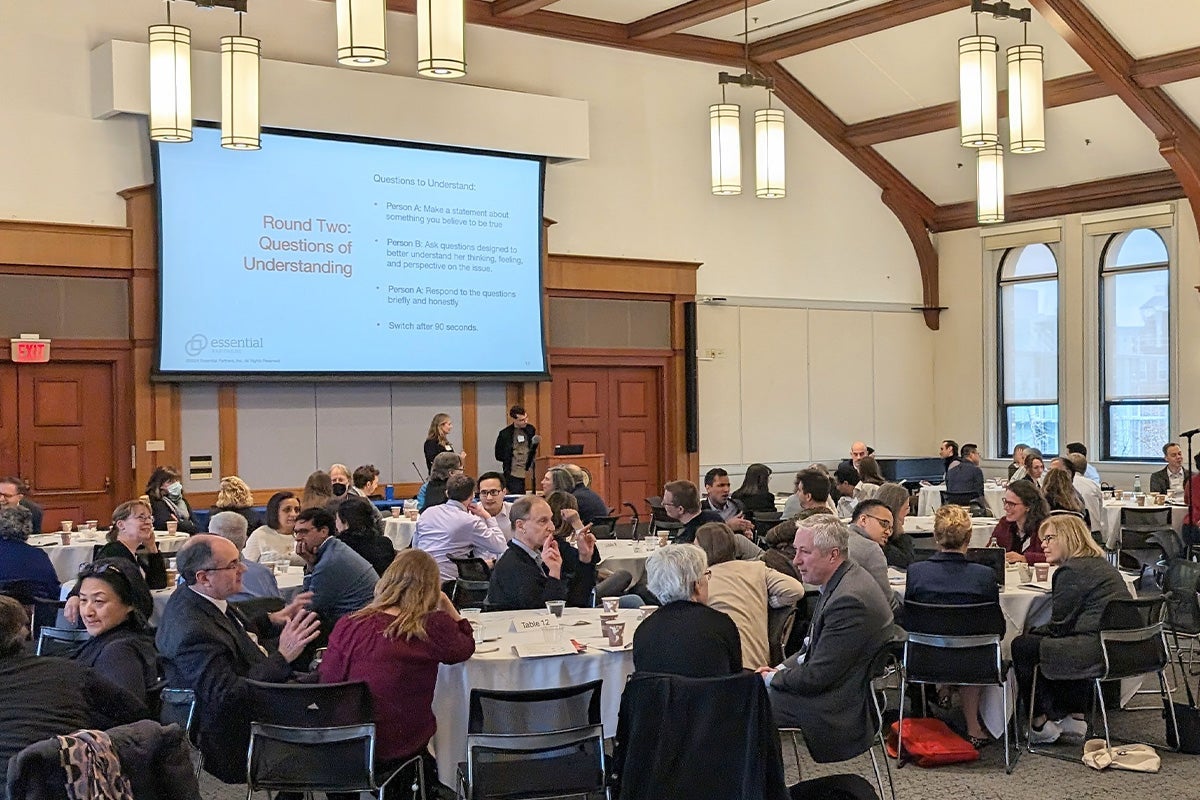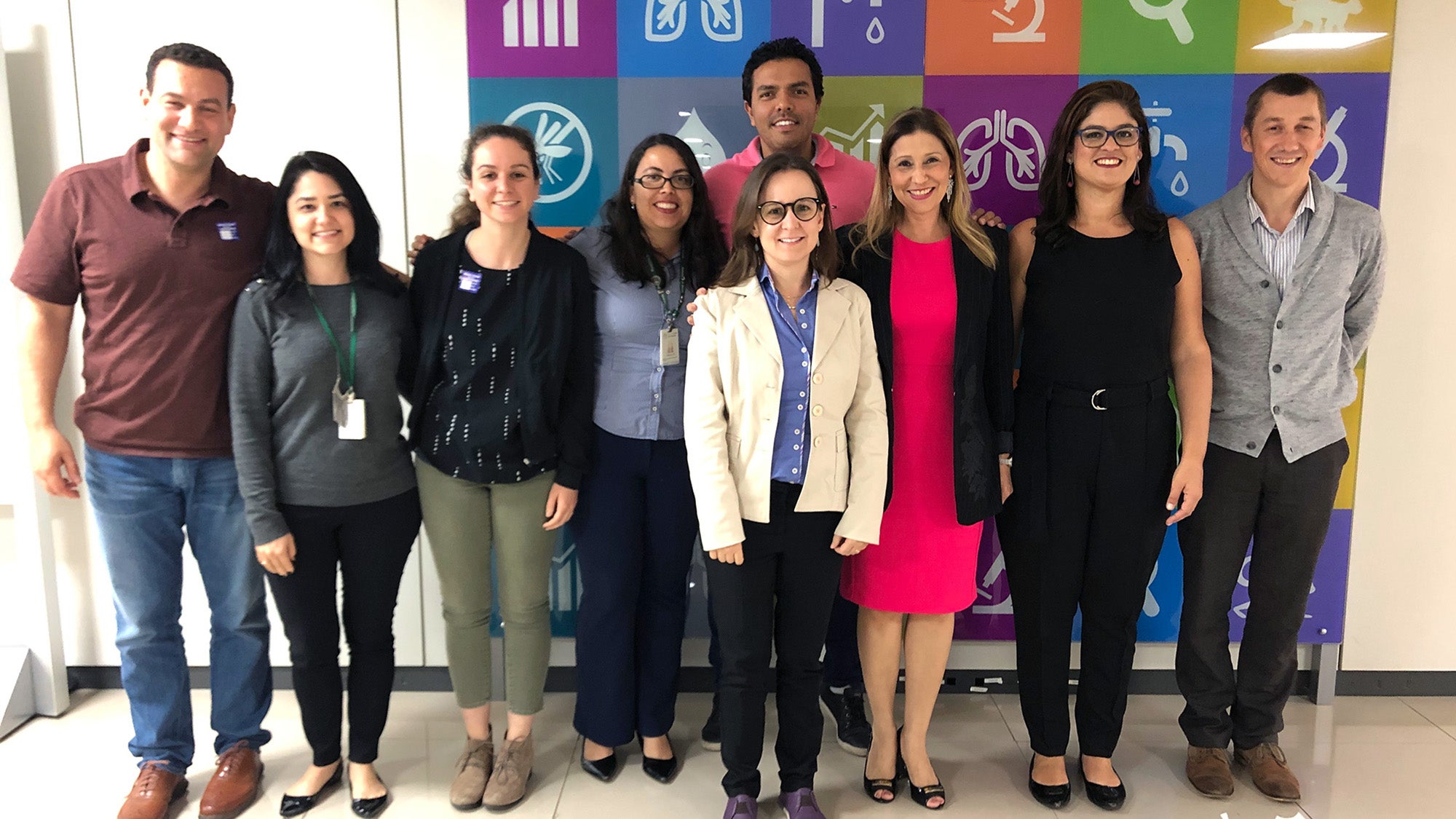Fostering constructive conversations across differences

June 27, 2024 – An effort begun last fall at Harvard T.H. Chan School of Public Health aims to support students, faculty, and staff in having constructive, respectful conversations—even when they have differing opinions on challenging topics.
Over the past academic year, the School has offered several workshops for community members on how to effectively hold constructive dialogues, with the broad goal of fostering a safe and inclusive culture. Going forward, programming will be offered under the newly launched Harvard Chan LEADs (Learn & Engage Across Differences) initiative.
The efforts are broadly supported by leadership across the school, including deans, senior leadership, and department chairs, according to Erin Driver-Linn, dean for education, who has been organizing the LEADs effort along with Amanda Spickard, associate dean for research strategy and external affairs.
“Engaging across differences isn’t always easy or comfortable, but it is essential to advance public health goals. We see it as a core competency for every member of our community—students, faculty, and staff,” said Andrea Baccarelli, dean of the faculty. “I’m proud of the work we’ve done so far to develop skills in this area, and I’m looking forward to building on those initiatives in the coming year.”
Advancing community values
The Harvard Chan LEADs initiative was launched in response to feedback from the community about challenging topics, including the Israel-Gaza war. “We have heard from members of our community that they find it difficult to voice their authentic opinions without being afraid that they’re going to be offensive, or that they’re going to be taken out of context,” Driver-Linn said.
The new initiative draws on the Harvard Chan School Principles of Citizenship, developed in 2023 to define the School’s foundational values: respecting the dignity and worth of every human being; upholding the highest standards of scientific, academic, and personal integrity; making the community kind and supportive for every member; and committing to listen and learn, especially from those who have long been marginalized.
The values set out in the Principles of Citizenship are not new, noted Spickard. “They’ve always been values of our School, but we’ve never articulated them. We haven’t overtly created the expectation that we’re all part of this community that agreed to advance these principles together,” she said. “We’re in the beginning stages of helping people practice strategies to actualize those values.”
Listening to different viewpoints
Last fall, over two dozen instructors across the School participated in a two-part workshop on facilitating challenging classroom conversations. Through both large and small group exercises, participants discussed topics such as how identity, power, and privilege play a role in classroom conversations. They also learned strategies for preparing for and facilitating conversations.
Fawn Phelps, instructor in the Office of Education, was one of the workshop participants. “I learned an incredible amount during the two sessions. We were given specific techniques to use when a conversation becomes difficult, examples of how to put those techniques into action, and an opportunity to talk with colleagues who had successfully used those techniques. One technique was to pause the conversation, name the challenging moment, and decide with the students if it would be better to continue in a small group after class or as a full class,” she said. “Also, the workshop was a fantastic opportunity to connect with colleagues at Harvard Chan School who are wrestling with the same questions about how to navigate situations when conversations become difficult.”
At the annual faculty retreat held in the spring, over 100 faculty participated in a workshop in which they learned to identify patterns that can make communication difficult—and how to shift those patterns so that students can engage constructively with one another. One example given during the workshop was that if one person tries to persuade another person with a different viewpoint, it could put that second person on the defensive. As an alternative, listening and seeking to understand another person’s different perspective could lead to more open dialogue.
During the spring semester, students had the opportunity to attend two different workshops. At one workshop, students participated in interactive exercises that emphasized the importance of listening to differing viewpoints during challenging conversations. Another for student leaders focused on how to design constructive conversations both at school and in their personal lives.
“We want to create safety for people to practice those tools in their own domains, whether in the classroom, a lab, research team meetings, or administrative forums,” said Spickard.
Upcoming programming for the Harvard Chan LEADs initiative will begin in August, during new student orientation.
– Jay Lau
Photo: Michelle Giuliana


